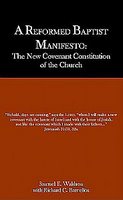 In Defense Of The Decalogue: A Critique of New Covenant Theology published in 2001 by Winepress Publishing is an excellent modern defense of the perpetuity of the Ten Commandments. (Yes, I just finished another book, w00t!) In dealing head on with New Covenant Theology’s attempt to walk the line between Dispensational and Covenant Theology, Richard Barcellos’ critique gives the reader an exegetically based understanding of the “law written on the heart at creation” and how that law was applied to the Nation of Israel and now to the church.
In Defense Of The Decalogue: A Critique of New Covenant Theology published in 2001 by Winepress Publishing is an excellent modern defense of the perpetuity of the Ten Commandments. (Yes, I just finished another book, w00t!) In dealing head on with New Covenant Theology’s attempt to walk the line between Dispensational and Covenant Theology, Richard Barcellos’ critique gives the reader an exegetically based understanding of the “law written on the heart at creation” and how that law was applied to the Nation of Israel and now to the church.
Barcellos does a fine job at defending the belief that the Ten Commandments are not just laws given at Mt. Sinai. He shows that the Laws including the Sabbath are based in the Book of Genesis. In doing so he actually avoids New Covenant theologian John Reisinger’s rebuttal:
“The Decalogue is the tablets of the covenant. Barcellos's statement, just quoted, could also be legitimately changed to read, "This critique ends up being a defense of the perpetuity of the document that formed an essential part of the terms of the old covenant that established Israel as a nation." Barcellos never admits that the Decalogue was the basic Old Covenant documentiii that initially established the nationhood of Israel. Actually he denies that the tablets of the covenant were a real part of the Old Covenant that was done away in Christ.”
Barcellos explains throughout the book the nature of the application of the moral law of God to the Old Covenant people. Barcellos also clearly shows how the New Covenant applies these Laws to the Christian. Resinger’s rebuttal, “He insists on calling the Decalogue the "moral law," with no textual evidence” rings hollow. Perhaps I am going out on a limb here, but every writer I have ever read that discusses the Ten Commandments almost always says at some point that they are a summary of God’s Moral Law. Whether or not you agree with Barcellos’ ability to argue his this point from Scripture seems moot to me.
Two differences are also given in Reisinger’s rebuttal that he considers foundational:
“Our difference is, (1) whether Moses is the greatest lawgiver that ever lived, including the Lord Jesus Christ himself, or (2) whether Jesus replaced Moses as the new prophet and lawgiver in the very same sense that he replaced Aaron as the new high priest.”
In my opinion, Barcellos dealt with these issues. Reisinger makes an attempt to differentiate between Moses and Christ where the New Testament isn’t making one. There is obviously discontinuity between the Covenants. But there is also continuity between the Covenants. We ought to allow the New Testament decide what those things are. This I think Barcellos does well.
 Another book that I highly recommend that explains the nature of the New Covenant is Sam Waldron’s A Reformed Baptist Manifesto: The New Covenant Constitution of the Church.
Another book that I highly recommend that explains the nature of the New Covenant is Sam Waldron’s A Reformed Baptist Manifesto: The New Covenant Constitution of the Church.






No comments:
Post a Comment